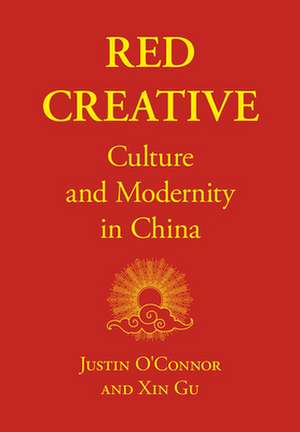Red Creative: Culture and Modernity in China
Autor Justin O'Connor, Xin Guen Limba Engleză Hardback – 14 ian 2021
Red Creative is an exploration of China’s cultural economy over the last twenty years, particularly through the lens of its creative hub of Shanghai. The research presented here raises questions about the nature of contemporary ‘creative’ capitalism and the universal claims of Western modernity, offering new ways of thinking about cultural policy in China.
Taking a long-term historical perspective, Justin O’Connor and Xin Gu analyze the ongoing development of China’s cultural industries, examining the institutions, regulations, interests, and markets that underpin the Chinese cultural economy and the strategic position of Shanghai within it. Further, the authors explore cultural policy reforms in post-colonial China and articulate Shanghai’s significance in paving China’s path to modernity and entry to global capitalism. In-depth and illuminating, Red Creative carefully situates China’s contemporary cultural economy in its larger global and historical context, revealing the limits of Western thought in understanding Chinese history, culture, and society.
Taking a long-term historical perspective, Justin O’Connor and Xin Gu analyze the ongoing development of China’s cultural industries, examining the institutions, regulations, interests, and markets that underpin the Chinese cultural economy and the strategic position of Shanghai within it. Further, the authors explore cultural policy reforms in post-colonial China and articulate Shanghai’s significance in paving China’s path to modernity and entry to global capitalism. In-depth and illuminating, Red Creative carefully situates China’s contemporary cultural economy in its larger global and historical context, revealing the limits of Western thought in understanding Chinese history, culture, and society.
Preț: 514.70 lei
Preț vechi: 723.91 lei
-29% Nou
Puncte Express: 772
Preț estimativ în valută:
98.50€ • 106.96$ • 82.74£
98.50€ • 106.96$ • 82.74£
Carte indisponibilă temporar
Doresc să fiu notificat când acest titlu va fi disponibil:
Se trimite...
Preluare comenzi: 021 569.72.76
Specificații
ISBN-13: 9781789383218
ISBN-10: 1789383218
Pagini: 320
Dimensiuni: 170 x 244 x 23 mm
Greutate: 0.7 kg
Editura: Intellect Ltd
Colecția Intellect Ltd
ISBN-10: 1789383218
Pagini: 320
Dimensiuni: 170 x 244 x 23 mm
Greutate: 0.7 kg
Editura: Intellect Ltd
Colecția Intellect Ltd
Notă biografică
Justin O’Connor is professor of cultural economy at the University of South Australia and visiting chair in the Department of Cultural Management at Shanghai Jiao Tong University in China. He is the coeditor of many books, most recently Cultural Industries in Shanghai: Policy and Planning inside a Global City, also published by Intellect. Xin Gu is a lecturer in the School of Media, Film and Journalism at Monash University in Melbourne, Australia. She is the coeditor of many books and special issues, including Re-imaging Creative Cities in Asia.
Cuprins
Chapter 1: Introduction: Unknown Knowns Chapter 2: The Creative Industries and the China Challenge Chapter 3: Culture, Modernity and the Nation-State Chapter 4: Shanghai: Cultural Industries and Modernity Chapter 5: Post-Reform China and Neoliberalism Chapter 6: China as a Civilizational State Chapter 7: Shanghai: Creative City Chapter 8: Reforming the Culture System Chapter 9: Creative Subjects
Recenzii
"Rather than another book about an apocalyptic and malevolent China, Red Creative is intensely attuned to the cross-currents of politics and culture in the country, and the ways in which revolutionary traditions and alternative modernities still influence the way in which culture is produced and politics is understood."
"Wide-ranging and insightful. . . . The interrogation of the significance of the concept of creative industries to China goes beyond the erroneous assumption that the introduction of the Western construct of creative industries brought modernity to China, and instead shows a distinctive development of the concept through multiple lenses including governance, subjectivity, citizenship, and the relationship between culture and production. The authors bring a different perspective to creative industries discourse, reigniting the significance of state/citizen and unraveling the (hollow) concept of the autonomy of the creative laborer central to Western approaches. Fundamentally, this book emphasizes the continued significance of the concept of the nation-state in cultural and creative industries discourse broadly. . . . [An] important decentering of the dominant Western position in this discourse."
"A fascinating book."
"A stunning piece of synthetic scholarship. It’s an essential overview of the limitations of major bodies of western thought in understanding Chinese history, culture, and society, especially the ways concepts of culture and creativity have been mobilized in China over the last twenty years."
"The book's scope is as remarkable as its depth. It presents an authoritative view of contemporary Chinese cultural policy and the development of the creative industries approach/agenda in China and the Asian region generally. It is a carefully crafted, fully researched analysis and assessment of a culture often treated as an object of fantasy by western intellectuals."
